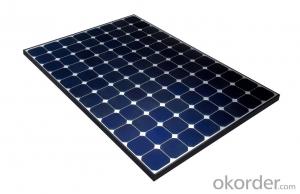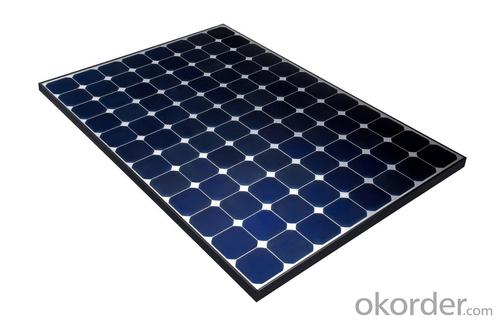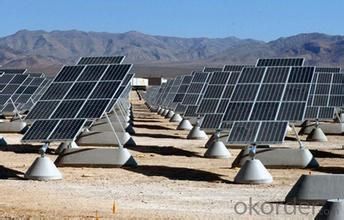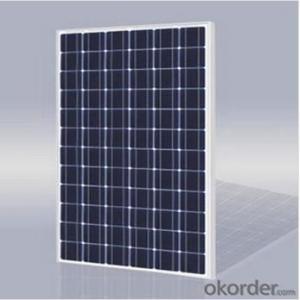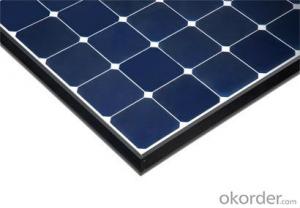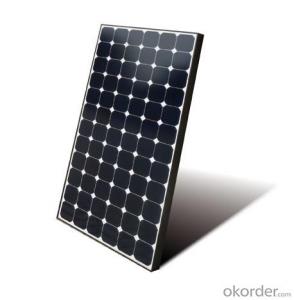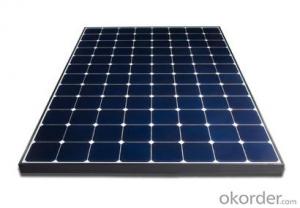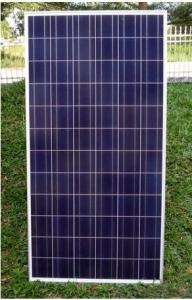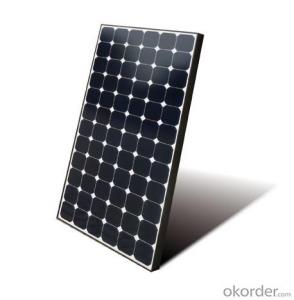Manitoba Solar Energy Systems - CNBM On Grid System 70000W with Certificate UL TUV CE
- Loading Port:
- Shanghai
- Payment Terms:
- TT OR LC
- Min Order Qty:
- 10 watt
- Supply Capability:
- 1000 watt/month
OKorder Service Pledge
OKorder Financial Service
You Might Also Like
Specification
CNBM On Grid System 70000W with Certificate UL TUV CE
Product description
A photovoltaic (in short PV) module is a packaged, connected assembly of typically 6×10 solar cells. Solar Photovoltaic panels constitute the solar array of a photovoltaic system that generates and supplies solar electricity in commercial and residential applications. Each module is rated by its DC output power under standard test conditions, and typically ranges from 100 to 365 watts. The efficiency of a module determines the area of a module given the same rated output – an 8% efficient 230 watt module will have twice the area of a 16% efficient 230 watt module. There are a few commercially available solar panels available that exceed 22% efficiency[1] and reportedly also exceeding 24%.[2][3] A single solar module can produce only a limited amount of power; most installations contain multiple modules. A photovoltaic system typically includes a panel or an array of solar modules, a solar inverter, and sometimes a battery and/or solar tracker and interconnection wiring.
The price of solar power, together with batteries for storage, has continued to fall so that in many countries it is cheaper than ordinary fossil fuel electricity from the grid (there is "grid parity").[4]
Off-the-grid is a system and lifestyle[1] designed to help people function without the support of remote infrastructure, such as an electrical grid. In electricity, off-grid can be stand-alone power system or mini-grids typically to provide a smaller community with electricity. Off-grid electrification is an approach to access electricity used in countries and areas with little access to electricity, due to scattered or distant population. The term off-the-grid (OTG) can refer to living in a self-sufficient manner without reliance on one or more public utilities. People who adopt this lifestyle are called off-gridders.[2]
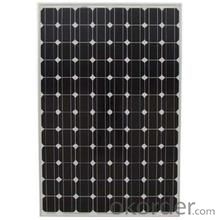
Application
Industrial
Commercial
Residential
Feature
Residential, grid-connected rooftop systems which have a capacity more than 10 kilowatts can meet the load of most consumers.[2] They can feed excess power to the grid where it is consumed by other users. The feedback is done through a meter to monitor power transferred. Photovoltaic wattage may be less than average consumption, in which case the consumer will continue to purchase grid energy, but a lesser amount than previously. If photovoltaic wattage substantially exceeds average consumption, the energy produced by the panels will be much in excess of the demand. In this case, the excess power can yield revenue by selling it to the grid. Depending on their agreement with their local grid energy company, the consumer only needs to pay the cost of electricity consumed less the value of electricity generated. This will be a negative number if more electricity is generated than consumed.[3] Additionally, in some cases, cash incentives are paid from the grid operator to the consumer.
Packaging
With carton and box
- Q: How do solar energy systems impact the reduction of energy transmission losses?
- Solar energy systems help reduce energy transmission losses in multiple ways. First, solar energy systems generate electricity at or near the point of consumption, eliminating the need for long-distance transmission lines. This reduces transmission losses that occur when electricity is transported over extensive distances. Additionally, solar energy systems operate on a decentralized model, meaning they are often installed on rooftops or in close proximity to the consumers. This proximity further reduces transmission losses as the generated electricity does not have to travel far to reach the end-users. Furthermore, solar energy systems convert sunlight directly into electricity without the need for intermediate steps like combustion or steam generation. This direct conversion eliminates the energy losses that occur during these intermediate processes, making solar energy systems more efficient in converting sunlight into usable electricity. Overall, solar energy systems contribute significantly to the reduction of energy transmission losses by generating electricity locally, minimizing the need for long-distance transmission lines, and operating on a direct and efficient conversion process.
- Q: What is the impact of electromagnetic interference on solar energy system performance?
- Electromagnetic interference can have a negative impact on the performance of solar energy systems. It can cause disruptions and fluctuations in the electrical signals and data transmission within the system, leading to reduced efficiency and reliability. Additionally, electromagnetic interference can interfere with the proper functioning of inverters and other critical components, potentially causing system failures and downtime. Therefore, it is crucial to implement proper shielding and mitigation measures to minimize the impact of electromagnetic interference on solar energy system performance.
- Q: Can solar energy systems be leased or rented?
- Yes, solar energy systems can be leased or rented. Leasing or renting solar energy systems allows individuals or businesses to enjoy the benefits of solar power without the upfront costs of purchasing and installing the equipment. This option is becoming increasingly popular as it offers a more affordable and flexible way to access clean and renewable energy.
- Q: Can solar energy systems be used in areas with limited space for ground-mounted installations?
- Solar energy systems can still be used in areas with limited ground space. Instead of traditional ground-mounted installations, alternative options like roof-mounted solar panels or vertical installations can be utilized. Roof-mounted solar panels are particularly popular for homes and buildings with limited ground space. They make use of the available roof area to capture sunlight and generate electricity. Another option is vertical solar panel installations, where panels are mounted on walls or other structures. These vertical installations allow for solar energy generation in tight spaces or even on building facades. Therefore, even in places with limited ground space, solar energy systems can still be effectively utilized through alternative mounting options.
- Q: What is the warranty period for solar energy systems?
- The warranty period for solar energy systems typically varies depending on the manufacturer, but it is commonly between 10 to 25 years.
- Q: Can solar energy systems be used in areas with strict environmental regulations?
- Yes, solar energy systems can be used in areas with strict environmental regulations. In fact, solar energy is often encouraged and incentivized by such regulations due to its clean and renewable nature. These systems do not produce harmful emissions or pollutants, making them an environmentally friendly option that aligns with strict regulations aimed at reducing carbon footprint and promoting sustainable practices.
- Q: Are there any maintenance requirements for solar energy systems?
- Yes, solar energy systems do have some maintenance requirements. These include regular cleaning of the solar panels to remove dirt and debris, checking for any damages or malfunctions, and ensuring proper electrical connections. Additionally, monitoring the system's performance and assessing its efficiency is necessary to ensure optimal functioning. Overall, while solar energy systems are low-maintenance compared to other energy sources, regular inspections and basic upkeep are essential for their longevity and effectiveness.
- Q: Can solar energy systems be installed on sports facilities or stadiums?
- Yes, solar energy systems can be installed on sports facilities or stadiums. In fact, many sports facilities around the world have already installed solar panels to generate clean and renewable energy. This not only helps in reducing their carbon footprint but also saves them on energy costs in the long run. Solar energy systems can be easily integrated into the design of sports facilities or stadiums, making it a viable and sustainable option for powering these large-scale venues.
- Q: Are solar energy systems scalable for different energy needs?
- Yes, solar energy systems are scalable for different energy needs. They can be designed and tailored to meet the specific energy requirements of residential, commercial, or industrial applications. The size and capacity of solar panels, inverters, and battery storage systems can be adjusted to match the desired energy output, making solar energy a flexible and scalable solution for a wide range of energy needs.
- Q: Can solar energy systems be used in areas with limited access to skilled labor?
- Yes, solar energy systems can be used in areas with limited access to skilled labor. Solar energy systems are designed to be simple and easy to install, requiring minimal technical expertise. With proper training and guidance, individuals with limited skills can learn to install and maintain solar panels. Additionally, advancements in technology have made solar systems more user-friendly, reducing the need for specialized knowledge. This makes solar energy a viable option for areas with limited access to skilled labor, providing clean and sustainable energy solutions.
Send your message to us
Manitoba Solar Energy Systems - CNBM On Grid System 70000W with Certificate UL TUV CE
- Loading Port:
- Shanghai
- Payment Terms:
- TT OR LC
- Min Order Qty:
- 10 watt
- Supply Capability:
- 1000 watt/month
OKorder Service Pledge
OKorder Financial Service
Similar products
Hot products
Hot Searches
Related keywords
